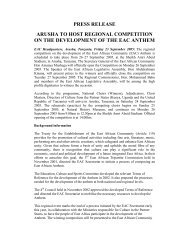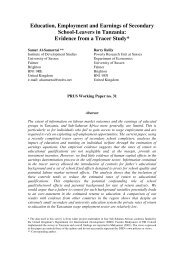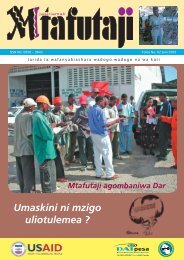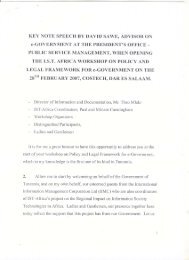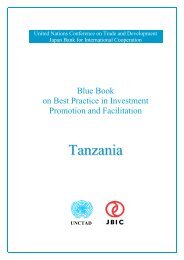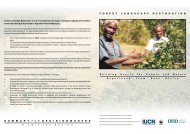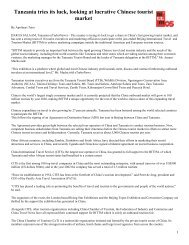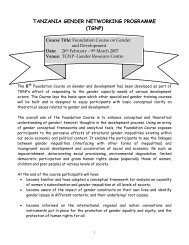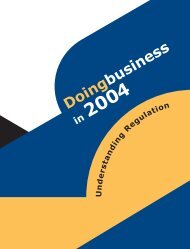Designing e-Government for the Poor - Tanzania Development ...
Designing e-Government for the Poor - Tanzania Development ...
Designing e-Government for the Poor - Tanzania Development ...
Create successful ePaper yourself
Turn your PDF publications into a flip-book with our unique Google optimized e-Paper software.
I. ORGANIZATION OF THE WORKSHOP<br />
A. Organization<br />
The Regional Workshop on <strong>Designing</strong> e-<strong>Government</strong> <strong>for</strong> <strong>the</strong> <strong>Poor</strong><br />
was organized by <strong>the</strong> Asian <strong>Development</strong> Bank Institute (ADBI) and <strong>the</strong><br />
United Nations Economic and Social Commission <strong>for</strong> Asia and <strong>the</strong> Pacific<br />
(ESCAP) with <strong>the</strong> support of <strong>the</strong> governments of Japan and <strong>the</strong> Republic of<br />
Korea, <strong>the</strong> Asian <strong>Development</strong> Bank (ADB), Microsoft Corporation and<br />
International Business Machines Corporation (IBM). The Workshop was<br />
designed to provide a <strong>for</strong>um <strong>for</strong> discussion on implementing e-government<br />
<strong>for</strong> <strong>the</strong> poor, and train participants in designing government portals, and<br />
draft action plans.<br />
B. Objectives of <strong>the</strong> Workshop<br />
Organization of <strong>the</strong> Workshop<br />
The objectives of <strong>the</strong> Workshop were to highlight <strong>the</strong> benefits of egovernment<br />
<strong>for</strong> <strong>the</strong> poor, and provide specific recommendations to develop<br />
strategies <strong>for</strong> <strong>the</strong> implementation of sustainable e-government.<br />
E-government has <strong>the</strong> potential to improve efficiency and transparency<br />
in <strong>the</strong> public sector, and promote greater accountability of <strong>the</strong><br />
government. It is a tool towards better governance which helps to limit<br />
corruption, minimize bureaucratic inefficiency, minimize time in processing<br />
government services, and brings <strong>the</strong> citizen, especially <strong>the</strong> poor, closer<br />
to <strong>the</strong> government processes. However, <strong>the</strong>re are a multitude of<br />
challenges in introducing and implementing e-government. A leading challenge<br />
is that poor and rural communities lack access to ICT and knowledge<br />
of its usage. Be<strong>for</strong>e an e-government system can be put in place,<br />
government must be reorganized, innovative policies administered, a legal<br />
framework <strong>for</strong> ICT established, and <strong>the</strong> citizens must be educated and<br />
trained.<br />
It is necessary to build awareness among national and local government<br />
policy makers and rural communities on <strong>the</strong> benefits that e-government<br />
can provide, and most importantly, to address <strong>the</strong> inequality in access<br />
to ICT. In support of that goal, <strong>the</strong> specific objectives of <strong>the</strong> Workshop<br />
were as follows:<br />
• To provide an opportunity to share experiences of implementing<br />
e-government <strong>for</strong> <strong>the</strong> poor in participating countries<br />
• To examine issues in implementing or planning e-government<br />
<strong>for</strong> <strong>the</strong> poor<br />
• To design e-government portals<br />
• To draft project proposals to introduce or improve e-government<br />
3



